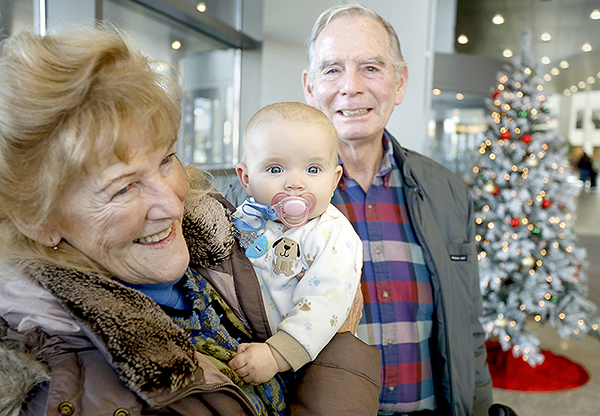Manny Morgan and her husband, Chris Corbett, of Cape Elizabeth spend a lot of time in the sky.
Every six months or so they make the trek to Anchorage, Alaska, to visit Corbett’s cardiologist son and his young family. But as convenient as cellphone calls might be during those long flights, Morgan and Corbett say they are adamantly against allowing cellphone conversations on airplanes.
“It is a terrible idea. I do not want to sit next to a person shouting away on a cellphone,” said Morgan.
The couple were responding to the news last week that the Federal Communications Commission has opened a months-long public comment period on whether to remove its restriction on in-flight cellphone calls. In-flight calls have been prohibited for the past 22 years due to concerns that they would interfere with cellular networks on the ground. Technological advances have removed those concerns.
But another federal agency, the Department of Transportation, which oversees aviation, is considering its own ban over concerns that in-flight calls would be annoying and disruptive to consumers.
Morgan and Corbett – who were at the Portland International Jetport on Saturday to see off daughter-in-law Nina Corbett, their 3-year-old grandson, Keith, and 7-month-old granddaughter, Corinne, who had been visiting from Alaska – said they see no compelling reason to allow phone calls during a flight.
Their response was similar to opinions voiced by other travelers interviewed at the jetport. Most said while they would welcome nonvocal mobile phone communications such as texting, phone conversations should remain banned in airplanes, where personal space is at a premium.
“Can you imagine multiple conversations going on around you?” said Corbett.
Lauren Williams, a Bates College student from Zimbabwe who was en route from Portland to St. Louis on Saturday, said travelers have managed to cope so far without in-flight cellphone calls and she sees no need to change at this point.
“You just prepare ahead. It doesn’t affect me that much,” said Williams.
Kylynn Adams of Gainesville, Ga., a senior at the University of Maine at Machias, said she sees pluses and minuses to in-flight phone communication.
“I am an avid cellphone user and would like to be able to text and email,” she said.
But Adams said she worries about privacy and the possibility of someone sitting next to her spying on her text messages.
Betsy Hopkins of Hope, waiting to pick up her daughter on a flight back from Portland, Ore., said she wouldn’t mind having access to texting. She flies about 10 times a year for her job as a director of a vocational training program.
“But frankly I don’t want to be overhearing someone else’s phone conservation,” Hopkins said.
Typing away on his laptop, with sound-insulated earphones attached to his iPhone, Inseo Hwang of Meriden N.H., said he sees no reason to ban voice phone communication on flights. He said not much noise gets past his earphones.
“As long as it is not excessive,” said Inseo, a Bates College freshman awaiting a flight to New York.
Michelle Emery of Old Orchard Beach said she might be in favor of in-flight phone calls, as long as airlines offered quiet zones on the plane where they would not be allowed.
“I know many trains have quiet zones,” she said.
Americans have had a lukewarm response so far to the FCC proposal. An Associated Press poll last week found 48 percent of Americans oppose the use of cellphones for voice calls while 19 percent are in favor. Thirty percent of those polled were neutral on the issue. Among those who have flown four or more times in the past year, the level of opposition to in-flight calls rises to 78 percent.
Opponents and proponents are lining up on the issue. The Telecommunications Industry Association supports the change, noting that in countries that allow cellphone use on airplanes the calls are generally short and infrequent. Last week Southwest Airlines started offering a new service to on-board passengers allowing them to use smartphones to text-message through a satellite connection.
On Thursday, Sens. Lamar Alexander, R-Tenn., and Dianne Feinstein, D-Calif., filed legislation to limit device use to texting and email if the FCC goes ahead and lifts its restriction on in-flight calls. Delta Air Lines announced it would not allow voice calls regardless of what the government decides on the issue.
Consumers may voice their comments on the proposed change on the FCC website: www.fcc.gov.
The Associated Press contributed to this report.
Beth Quimby can be contacted at 791-6363 or at:
bquimby@pressherald.com
Send questions/comments to the editors.




Success. Please wait for the page to reload. If the page does not reload within 5 seconds, please refresh the page.
Enter your email and password to access comments.
Hi, to comment on stories you must . This profile is in addition to your subscription and website login.
Already have a commenting profile? .
Invalid username/password.
Please check your email to confirm and complete your registration.
Only subscribers are eligible to post comments. Please subscribe or login first for digital access. Here’s why.
Use the form below to reset your password. When you've submitted your account email, we will send an email with a reset code.